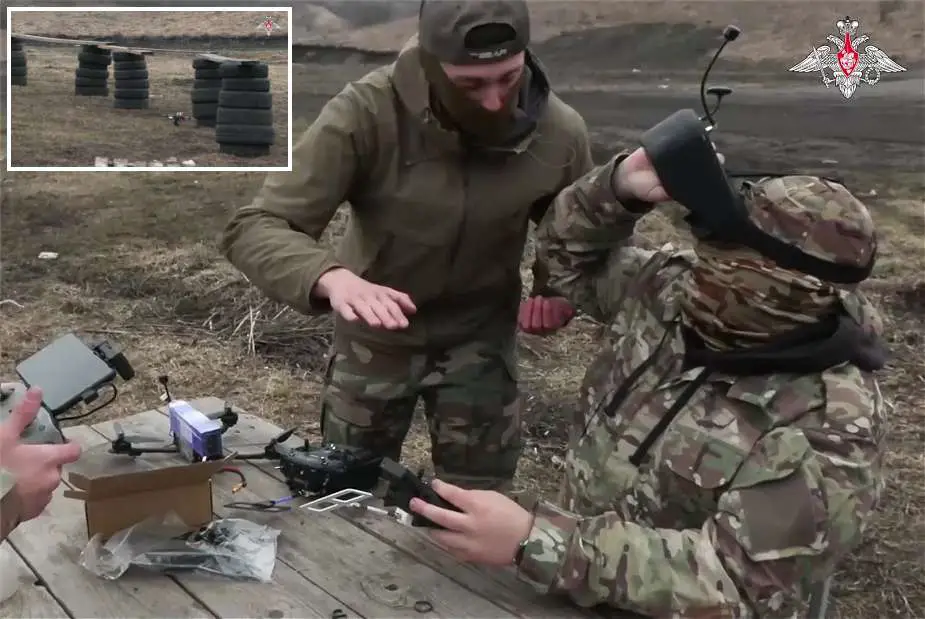Breaking news
Russia Strengthens Drone Operators Training & Recruitment Amid Intensive UAVs Use in Ukraine.
According to information published by the Russian Ministry of Defense via a video on April 5, 2024, the Russian army has launched a large program to recruit and train a new generation of drone operators following the intensive use of FPV (First Person View) drones on the battlefield in Ukraine.
Follow Army Recognition on Google News at this link

Citing information published by the Russian Ministry of Defense, the Russian army is increasing the recruitment and training of drone operators. (Picture source video footage Russian MoD)
In the dynamic realm of modern warfare, Unmanned Aerial Vehicles (UAVs) have emerged as pivotal assets, transforming reconnaissance and engagement strategies. A Russian army senior instructor, known by the call sign “Kremlin,” has shed light on the rigorous training that military personnel undergo to become proficient UAV operators, a process that spans over a month and is crucial for mastering these advanced technological tools.
The training regimen commences with simulator sessions, allowing recruits to familiarize themselves with UAV operations in a controlled environment. This is supplemented by theoretical lectures covering the intricacies of UAV technology, including assembly and soldering techniques. The final two weeks are dedicated to practical, hands-on training at the training ground, where participants engage in real-world scenarios, simulating flights, formations, and precision targeting exercises. The use of digital drones, capable of deploying hand grenades and specialized munitions, marks a significant advancement in the application of UAVs in combat.
Since the beginning of the war in UKraine, UAVs have been integral to reconnaissance missions and fire adjustment, proving to be indispensable for the accurate targeting of enemy positions and monitoring of reserve unit movements. Their ability to detect and warn against ambushes in real time has been instrumental in safeguarding the lives of countless soldiers.
The effectiveness of UAVs in combat is continuously enhanced through technical modernization, reflecting an adaptive approach to warfare. According to “Kremlin,” the drone operator training programs are constantly refined, drawing on the firsthand experiences of military personnel involved in special operations. This ensures that the use of drones remains at the cutting edge of military technology, with instructors actively participating in frontline engagements to evaluate and improve both the hardware and operational tactics of UAVs.
In the ongoing Russian-Ukrainian War, Unmanned Aerial Vehicles (UAVs) and FPV (First Person View) drones have emerged as pivotal assets, transforming reconnaissance and engagement strategies. A senior instructor, known by the call sign 'Kremlin,' has highlighted the rigorous training that military personnel undergo to become proficient UAV operators—a process that spans over a month and is crucial for mastering these advanced technological tools.
The primary function of drones in this context has been for surveillance and reconnaissance. They offer real-time, aerial imagery and data, enabling Russian forces to monitor Ukrainian troop movements, fortifications, and civilian infrastructure with minimal risk. This capability not only aids in strategic planning but also in the adaptation of tactics in response to evolving battlefield conditions.
Moreover, drones extend the reach of Russian artillery, serving as spotters to correct fire and increase the accuracy of strikes. By providing direct feedback from the battlefield, drones facilitate the precise targeting of Ukrainian positions, minimizing ammunition waste and maximizing damage.
Drones are also utilized for direct combat roles, equipped with munitions to engage targets independently. This application represents a shift towards more autonomous systems on the battlefield, where drones can hunt and strike enemy forces, vehicles, or installations without direct human intervention.
Additionally, the psychological impact of drone warfare cannot be underestimated. The constant threat of surveillance and sudden, precise strikes can degrade the morale of Ukrainian forces and civilians alike, contributing to a climate of fear and uncertainty.
The commitment to ongoing technical advancement underscores the critical role that drones play in contemporary military strategies, offering a glimpse into the future of warfare where technological superiority increasingly determines the outcome of conflicts.
Defense News April 2024


























